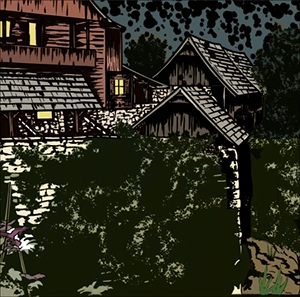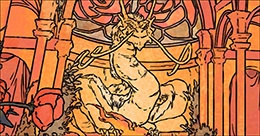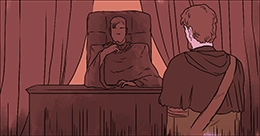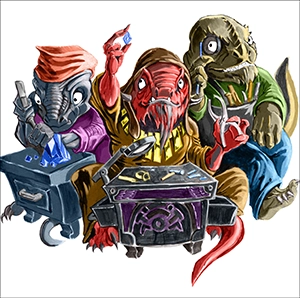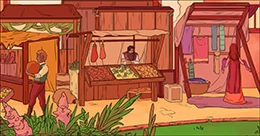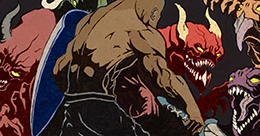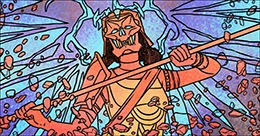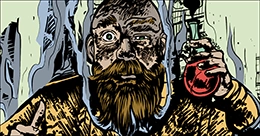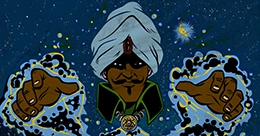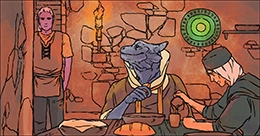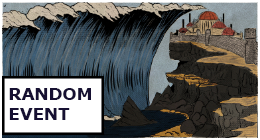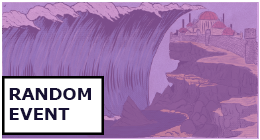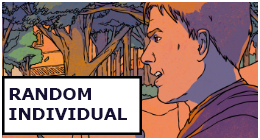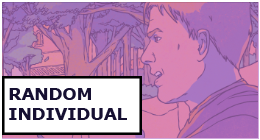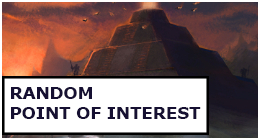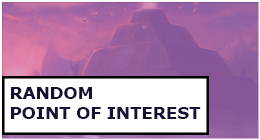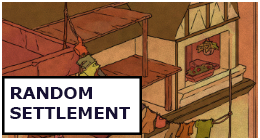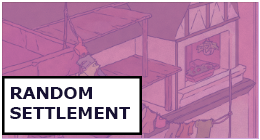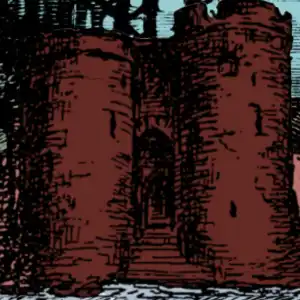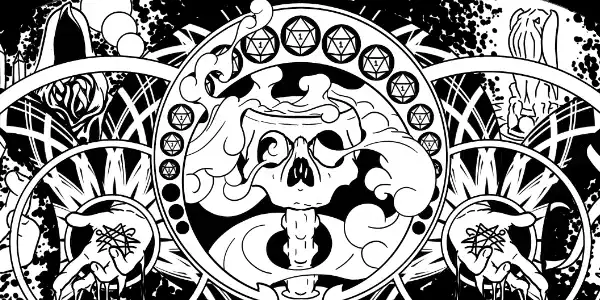Chapter Three: Religions
Chapter 3:
Religions
• Faiths of Dromaria
The Covenant
Path of the Ancestors
The Calling
Illumination
Lothoren
Summertide
Other Beliefs
• The Gods
Religions
• Faiths of Dromaria
The Covenant
Path of the Ancestors
The Calling
Illumination
Lothoren
Summertide
Other Beliefs
• The Gods
Faiths of Dromaria
In Dromaria, religion is a significant part of society, inseparable from daily life and culture. The most prevalent belief systems, such as The Covenant, serve as faiths and practical agreements that bind the people. Across Dromaria, religious practices vary widely, with individuals paying homage to multiple gods or specific Ancestors through churches, holidays, rituals, and stories.
As proof of faith, Chosen and divine Champions walk the world, performing miracles and wielding divine magic as tangible evidence of the gods' presence. The connection between religion and people is an active part of Dromaria's identity.
Religion in Dromaria is crafted so players and GMs can engage with it as desired. A significant aspect of Dromarian faith is the understanding of the Ancestors. The Ancestors are those who originally traveled across the stars and settled Dromaria. However, within Dromaria itself, the term Ancestors has become synonymous with any of the gods. Considered real beings who once inhabited the world as heroes, villains, myths, and legends, there is tangible proof of their existence. Records in Song Stones, monumental texts, and physical interactions with beings like Groman have created cultures that fundamentally understand what is owed to those who came before them. Players may immerse themselves in faith, understanding its morals, traditions, and influence on their character's worldview. GMs can utilize religion to craft NPCs, personal dilemmas, quests, and conflicts. Adventurers may seek divine intervention, draw on faith for abilities, or undertake quests resonating with their beliefs. In the modern era, most of Dromaria's gods act outside society's purview, transcending normal beings despite bearing mortal forms. They are neither omnipotent nor omniscient; their actions and knowledge have limits. Those gods who still walk the land do so in secrecy, maintaining relationships as varied and intricate as any mortal's. To immerse characters into Dromaria's religious landscape, consider how different faith paths may influence daily routines, decisions, and interactions. For instance, a cleric aligned with the Covenant might make it a practice to visit and pay respect to any local dragons upon arriving in a new location. Players can engage with local festivals, partake in religious ceremonies, or explore lesser-known sects within their region. By linking character beliefs to tangible quests and moral dilemmas, the spiritual life of Dromaria can become an engaging part of the adventure.
"Before the dawn of Serithell's divine recognition, I had already pledged my soul to her celestial call. Faith is the surrender of oneself to a greater cause. My promise to Serithell is not to diminish the sacred fires that burn in other hearts but to ignite them. The constellation of divinity is ever-changing, stars of old gods dimming as those of new gods brighten. Thus has it always been, thus shall it ever be."Roleplaying Religion~ Seinaru Kotodama
Letter to the Emperor
Religion in Dromaria is crafted so players and GMs can engage with it as desired. A significant aspect of Dromarian faith is the understanding of the Ancestors. The Ancestors are those who originally traveled across the stars and settled Dromaria. However, within Dromaria itself, the term Ancestors has become synonymous with any of the gods. Considered real beings who once inhabited the world as heroes, villains, myths, and legends, there is tangible proof of their existence. Records in Song Stones, monumental texts, and physical interactions with beings like Groman have created cultures that fundamentally understand what is owed to those who came before them. Players may immerse themselves in faith, understanding its morals, traditions, and influence on their character's worldview. GMs can utilize religion to craft NPCs, personal dilemmas, quests, and conflicts. Adventurers may seek divine intervention, draw on faith for abilities, or undertake quests resonating with their beliefs. In the modern era, most of Dromaria's gods act outside society's purview, transcending normal beings despite bearing mortal forms. They are neither omnipotent nor omniscient; their actions and knowledge have limits. Those gods who still walk the land do so in secrecy, maintaining relationships as varied and intricate as any mortal's. To immerse characters into Dromaria's religious landscape, consider how different faith paths may influence daily routines, decisions, and interactions. For instance, a cleric aligned with the Covenant might make it a practice to visit and pay respect to any local dragons upon arriving in a new location. Players can engage with local festivals, partake in religious ceremonies, or explore lesser-known sects within their region. By linking character beliefs to tangible quests and moral dilemmas, the spiritual life of Dromaria can become an engaging part of the adventure.
The Grand Prophecy
When the Ancestors journeyed across the solar system, their path led them to the distant planet Malkari. There, they encountered Narwel, a divine being with insight into the vast intricacies of existence; the goddess spoke a prophecy that became a foundational aspect of history.
Narwel foresaw that the settlers' future was a place that would become known as Dromaria. This land, with its potential, was the first of her visions. But the most debated aspect of the prophecy was the prediction of a creation or birth of a being—a god, hero, or savior. There would be a birth—a god, hero, or savior. This figure, foretold by Narwel, was destined to rise from the Ancestors and play a crucial role in the unfolding destiny of the new world.
The prophecy was only spoken once and its exact words were never recorded. Over time, various traditions have sought to interpret the Grand Prophecy, shaping it into beliefs that resonate with their unique perspectives.
After Death
In Dromaria, the cycle of death and rebirth is a regularly accepted concept. Upon death, a soul travels to Polurn, a place often described as a garden, where it is prepared for rebirth.
The Dromarian religions typically emphasize guiding principles and behaviors, teaching how one's current actions may influence the next life. These scriptures traditionally create a pragmatic approach to life and death. Some less followed paths may pervert traditions, flirting the line of undeath or using the soul for other means.
Magic that centers around resurrection is traditionally taboo and often outlawed. With the recent news spreading of souls becoming Untethered, opinions may change.
The Covenant
In the earliest days of settling Dromaria, a desperate time of chaos and conflict between mortals and dragons threatened to tear the world asunder. In this tumultuous period, the Ancestors, serving as mortal ambassadors, met with the ancient dragons to forge an agreement known as the Covenant. What began as a set of commandments to end the warfare and bring much-needed peace has since evolved into a complex religious system, binding the world together.
The followers of the Covenant are not simply adherents to a set of rules; they are the bearers of a sacred trust that transcends generations. The Covenant's precepts are taught and honored, not as mere laws but as a spiritual doctrine. The dragons are venerated and respected, their very presence a reminder of the ancient pact that continues to shape the lives of the people of Dromaria. Organization
The Covenant's religious structure comprises churches dedicated to maintaining the delicate balance between mortals and dragons. They work to preserve the power equilibrium and the ancient culture, nurturing a symbiotic relationship. Both Dromadaes and Matunas churches teach the ways of arcane and magic, each with distinct philosophies and practices, yet united in their reverence for the dragons and the Covenant. Temilian, as a guiding presence, is present in the teachings of both, underscoring the unity of purpose. Other Perspectives
To many, the Covenant is a fact of daily life, its importance acknowledged but nonintrusive. In places like Erimata, where dragons are seen frequently, it is a more palpable force. Others view it with skepticism or even disdain. Illumination factions, particularly Lothoren, sometimes regard it as overbearing, and ancient paths like Tus'Alim are indifferent. The Covenant's significance, however, is undeniable, as the Path of the Ancestors culminates in this ancient agreement.
"The Covenant we share was birthed from necessity, yes, but it has blossomed into a nexus between our species. In its wisdom, this sacred pact has graced even dragons with the gift of empathy towards lesser beings. My father, Tollu'tallaria, bore the mantle of the Sovereign Sage among mortals, the revered Dragon Sage. During his tenure, the most invaluable lesson we unearthed was the startling kinship that binds us, overshadowing any disparities that might divide our lives."Followers
~ Elovesor
Scion of the Sage
The followers of the Covenant are not simply adherents to a set of rules; they are the bearers of a sacred trust that transcends generations. The Covenant's precepts are taught and honored, not as mere laws but as a spiritual doctrine. The dragons are venerated and respected, their very presence a reminder of the ancient pact that continues to shape the lives of the people of Dromaria. Organization
The Covenant's religious structure comprises churches dedicated to maintaining the delicate balance between mortals and dragons. They work to preserve the power equilibrium and the ancient culture, nurturing a symbiotic relationship. Both Dromadaes and Matunas churches teach the ways of arcane and magic, each with distinct philosophies and practices, yet united in their reverence for the dragons and the Covenant. Temilian, as a guiding presence, is present in the teachings of both, underscoring the unity of purpose. Other Perspectives
To many, the Covenant is a fact of daily life, its importance acknowledged but nonintrusive. In places like Erimata, where dragons are seen frequently, it is a more palpable force. Others view it with skepticism or even disdain. Illumination factions, particularly Lothoren, sometimes regard it as overbearing, and ancient paths like Tus'Alim are indifferent. The Covenant's significance, however, is undeniable, as the Path of the Ancestors culminates in this ancient agreement.
Associated Deities
Path of the Ancestors
The Path of the Ancestors, a creation of the goddess Sorona, began as an actual pilgrimage from the city of Yu'Yrel to the Arcane Sacrarium, a mysterious building that harbored the Ancestors' wisdom. The Path sought to honor Tus'Alim, the first-god, acknowledged by all Ancestors, and remind Dromaria of its past, guided by teachings through the Godswept Peaks.
But time wore on, the original villages that were once spiritual guides became cursed, and the Path's physical form was forgotten. It transformed into a religion, its teachings often corrupted, and its guardian, Seveth Van Dem, husband of Sorona, became a monstrous tale of danger. The purpose of the Path has been eclipsed by other faiths like Illumination, and its original intentions lost to history.
Today, the Path is perceived as a collection of heroics and parables akin to popular stories. Though some take it seriously, acknowledging the tangible evidence of the gods' deeds, most see it as a fabled guide to the past. Followers include historians, people dedicated to Sorona or Tus'Alim such as the Upiryrials, seekers of ancient wisdom, and the people of Zan'deil. It is believed that the true relationship between the Path and the Ancestors awaits discovery within the Sacrarium, accessible only to those possessing the necessary blessings. Organization
The Path has been decentralized and distorted over the millennia. The original journey has been replaced by fragmented texts and teachings, and the Arcane Sacrarium is a lost wonder. Only scholars, the highly religious, and the champions of gods continue to pursue the knowledge locked within the Sacrarium. Other Perspectives
Many view the Path as outdated, unreliable, and even perilous. Some label it with disdain, comparing it to discredited practices from a bygone era. Zan'deil is perceived as a land of barbarians and mad dragons, where the Path's true teachings are misconstrued. The Sacrarium itself is seen as a mere legend, hunted only by those obsessed with ancient places.
"My existence I consecrate to the Path; my very soul, an offering to Sorona. With solemn vow, I bind myself to the guardianship and preservation of the Path of the Ancestors. Each droplet of my lifeblood shall sanctify its sacred ground, ensuring its eternal endurance. My indomitable will shall intertwine with the footsteps of those who venture its corridors. All who tread this venerable trail shall glimpse the truths of their forebears, unveiled through the lens of their own heritage. By the immutable authority vested within me, this I etch into time."Followers~ Seveth Van Dem
The Forefather
Inscribed on the inner doors of the Arcane Sacrarium
Today, the Path is perceived as a collection of heroics and parables akin to popular stories. Though some take it seriously, acknowledging the tangible evidence of the gods' deeds, most see it as a fabled guide to the past. Followers include historians, people dedicated to Sorona or Tus'Alim such as the Upiryrials, seekers of ancient wisdom, and the people of Zan'deil. It is believed that the true relationship between the Path and the Ancestors awaits discovery within the Sacrarium, accessible only to those possessing the necessary blessings. Organization
The Path has been decentralized and distorted over the millennia. The original journey has been replaced by fragmented texts and teachings, and the Arcane Sacrarium is a lost wonder. Only scholars, the highly religious, and the champions of gods continue to pursue the knowledge locked within the Sacrarium. Other Perspectives
Many view the Path as outdated, unreliable, and even perilous. Some label it with disdain, comparing it to discredited practices from a bygone era. Zan'deil is perceived as a land of barbarians and mad dragons, where the Path's true teachings are misconstrued. The Sacrarium itself is seen as a mere legend, hunted only by those obsessed with ancient places.
Associated Deities
The Calling
The Calling is more than a mere belief; it's an echo of the universe's own desire, a mysterious impulse that stirs in the hearts of those attuned to its vibrations. It is a musician hearing a fleeting melody on the wind, compelled to capture its soul, or a master carver coaxing a perfect creation from flawed marble. Those who follow The Calling believe that existence sends out shockwaves of inspiration, longing for realization. Through their labors, they seek to fulfill the universe's need, participating in a cosmic cycle of transcendence.
Different cultures and individuals interpret and embrace The Calling in unique ways. The elves of Leng, for instance, channel it into exquisite art and song. In contrast, the dwarves of Forn follow their teachings to forge legendary blades and carve masterful statues. A particular group of dwarves in Undai see the goddess of beauty, Vale, as the living embodiment of The Calling and revere her as a great muse. Malkari, following the ways of Bako, pursue a deeper understanding through discipline, channeling The Calling into perfection of mind, body, and spirit. The orcs of Ugarth, inspired by Dona's teachings, utilize The Calling to fuel technological innovation. Organization
In "The Calling," the pursuit of personal and communal transcendence does not rely on traditional structures of worship. Unlike most faiths that centralize around temples or churches, followers of The Calling find sanctity in the journey itself, whether it's a solitary quest for personal understanding or a communal effort to enrich the whole. Gathering places do exist, often taking the form of workshops, studios, or even innovation hubs, where like-minded individuals can exchange ideas and share their interpretations of each other's craft. Group callings are not uncommon, where a collective vision or shared inspiration guides a community's endeavors. These can manifest in grand projects, such as a large choreographed dance routine or developing a groundbreaking piece of technology. The communal experience often becomes a spiritual endeavor itself, a tangible expression of The Calling's mysterious impulse. Other Perspectives
Not everyone shares a romantic view of The Calling. To some outsiders, the devotion and singular focus of the followers may appear selfish or self-serving. Lost in the pursuit of higher understanding and creation, they are often too engrossed in heeding the universe's will to be swayed by the opinions of others.
"I devoted a hundred years to understanding Ael'mashtir, dedicating myself to the art of the blade. The next century was spent mastering metalwork, crafting perfection to fit the contours of my hands, allowing it to slide through the sheath with a grace only I could feel. For one hundred years more, I challenged any who dared to face me. But it wasn't until I set down my sword and taught that I began to understand the depth of my Calling."Followers~ Proelia Summus
"The Greatest Blademaster"
Different cultures and individuals interpret and embrace The Calling in unique ways. The elves of Leng, for instance, channel it into exquisite art and song. In contrast, the dwarves of Forn follow their teachings to forge legendary blades and carve masterful statues. A particular group of dwarves in Undai see the goddess of beauty, Vale, as the living embodiment of The Calling and revere her as a great muse. Malkari, following the ways of Bako, pursue a deeper understanding through discipline, channeling The Calling into perfection of mind, body, and spirit. The orcs of Ugarth, inspired by Dona's teachings, utilize The Calling to fuel technological innovation. Organization
In "The Calling," the pursuit of personal and communal transcendence does not rely on traditional structures of worship. Unlike most faiths that centralize around temples or churches, followers of The Calling find sanctity in the journey itself, whether it's a solitary quest for personal understanding or a communal effort to enrich the whole. Gathering places do exist, often taking the form of workshops, studios, or even innovation hubs, where like-minded individuals can exchange ideas and share their interpretations of each other's craft. Group callings are not uncommon, where a collective vision or shared inspiration guides a community's endeavors. These can manifest in grand projects, such as a large choreographed dance routine or developing a groundbreaking piece of technology. The communal experience often becomes a spiritual endeavor itself, a tangible expression of The Calling's mysterious impulse. Other Perspectives
Not everyone shares a romantic view of The Calling. To some outsiders, the devotion and singular focus of the followers may appear selfish or self-serving. Lost in the pursuit of higher understanding and creation, they are often too engrossed in heeding the universe's will to be swayed by the opinions of others.
Associated Deities
Illumination
Illumination is a major religious structure in Dromaria, stemming from the teachings of the Ancestor Sorona Van Dem and a prophesied coming savior, as heralded by the goddess Narwel. At its core, Illumination seeks to guide its followers towards a path of truth and prosperity. The belief has given birth to several branches, including Summertide and Lothoren, each with its distinct interpretation of the prophecy.
Devotees of Illumination are often drawn by its teachings of hope and the promise of protection. They adhere to the principles laid down in the Tome of Valediction and other sacred texts, and their faith has grown in conjunction with the rise of legendary figures like Lothor. Followers of Illumination include common people seeking guidance, scholars interpreting the prophecy, and holy warriors on a spiritual quest. Organization
Illumination is organized around temples, religious scholars, and spiritual leaders who work to spread the teachings and interpret the prophecy. There's a hierarchy within the faith, with higher-ranking priests and priestesses guiding the spiritual journey of their congregations. The branches, such as Lothoren and Summertide, have their distinct structures but share common principles. Other Perspectives
Illumination's belief in a prophesied deity has led to different interpretations, spawning branches like Lothoren and Summertide, each viewing a different figure as the prophesied hero. These differences have sometimes led to tension between the branches, with debates on the true fulfillment of Narwel's prophecy. The religious landscape sees them as significant faiths, with varying degrees of acceptance and skepticism from other beliefs and cultures within Dromaria.
"When the goblin approached us with her audacious scheme, I deemed her ensnared by evil. The notion of shattering the world to mend it seemed the discourse of one who had forsaken righteousness. Yet in this, my esteemed Lothor perceived truths beyond my grasp. His radiance illumined Thurknot, and by his divine grace, she was granted the understanding to fulfill her aspirations without laying waste to our Civil Kingdom, instead rising as a Crusader of Illumination. Bathed in the wisdom of Sorona's sacred words, let us intone this solemn prayer: 'O Sorona, Guiding Light of our kingdom, bestow upon us your sagacious insight. May our paths be lit by your wisdom, and may our hearts be fortified against the shadow of ignorance.'"Followers~ Ygrette Lothor
The Plans of Savagery
"Tome of Valediction"
Devotees of Illumination are often drawn by its teachings of hope and the promise of protection. They adhere to the principles laid down in the Tome of Valediction and other sacred texts, and their faith has grown in conjunction with the rise of legendary figures like Lothor. Followers of Illumination include common people seeking guidance, scholars interpreting the prophecy, and holy warriors on a spiritual quest. Organization
Illumination is organized around temples, religious scholars, and spiritual leaders who work to spread the teachings and interpret the prophecy. There's a hierarchy within the faith, with higher-ranking priests and priestesses guiding the spiritual journey of their congregations. The branches, such as Lothoren and Summertide, have their distinct structures but share common principles. Other Perspectives
Illumination's belief in a prophesied deity has led to different interpretations, spawning branches like Lothoren and Summertide, each viewing a different figure as the prophesied hero. These differences have sometimes led to tension between the branches, with debates on the true fulfillment of Narwel's prophecy. The religious landscape sees them as significant faiths, with varying degrees of acceptance and skepticism from other beliefs and cultures within Dromaria.
Associated Deities
Lothoren
Lothoren, a major branch of Illumination, centers around the belief that Lothor is the fulfillment of Narwel's Grand Prophecy. What sets Lothoren apart is the distinct elevation of Ulric Lothor as the true hero, as detailed in the Civil Gospels penned by his daughter Gwynn. As a faith celebrating Lothor's heroism, it has become the largest in Dromaria.
Followers of Lothoren venerate Lothor and his crusade, subscribing to teachings that emphasize rebirth, holiness, and Lothor's divine role. They are often deeply committed to their faith, finding strength and purpose in Lothor's example. Organization
Lothoren's organization includes a hierarchy of priests, scholars, and devoted warriors, with temples and holy sites dedicated to the god's memory. The faith emphasizes particular tenants, such as the guidance of Lothor in rebirth and the end of horrors through Lothor's coming. Other Perspectives
Lothoren's interpretation of the prophecy can cause tension with other branches like Summertide. Though relations have been amicable, growing popularity has led to increased impatience with differing interpretations. Lothoren is respected by many in Dromaria but may face skepticism from those outside the faith.
"Verily, Ulric Lothor is the anointed sword of divine reckoning, a beacon in the black abyss of injustice. Let those who sow discord and malevolence tremble, for Lothor is the manifest will of celestial retribution. By his hand shall the scales of justice be balanced, and the wicked find no refuge from their dark deeds."Followers
~ Gwynn Lothor
Chapter 4, Retribution
"The Civil Gospels"
Followers of Lothoren venerate Lothor and his crusade, subscribing to teachings that emphasize rebirth, holiness, and Lothor's divine role. They are often deeply committed to their faith, finding strength and purpose in Lothor's example. Organization
Lothoren's organization includes a hierarchy of priests, scholars, and devoted warriors, with temples and holy sites dedicated to the god's memory. The faith emphasizes particular tenants, such as the guidance of Lothor in rebirth and the end of horrors through Lothor's coming. Other Perspectives
Lothoren's interpretation of the prophecy can cause tension with other branches like Summertide. Though relations have been amicable, growing popularity has led to increased impatience with differing interpretations. Lothoren is respected by many in Dromaria but may face skepticism from those outside the faith.
Associated Deities
Summertide
Summertide is a nature-focused branch of the Illumination faith, rooted in the teachings of the goddess Sorona and the goddess Asir's belief in Groman as the prophesied hero. The faith emphasizes balance, respect for land and animals, and reparations to the dragons.
"In the dappled light of the forest and the murmur of flowing streams, the wisdom of Sorona and Asir whispers to us. We walk the path of Groman, finding sacred equilibrium between fang and leaf, fire and water. It is not merely the land we seek to heal, but the very sinews of the world itself, stitched together by the Covenant's unbreakable thread."~ Asir Summertide
From the Scriptures of Saint Vale Van Dem Followers
Those drawn to Summertide often have a deep connection to nature, valuing the teachings of Groman and the wisdom of the goddesses. Summertide followers are seen as advocates and allies, upholding the Covenant and working to mend the scars of the past. Organization
Summertide is organized around temples, wise leaders, and devout followers who seek to maintain harmony with nature. The faith venerates figures like Vale, Peruvus, Lothor, and Temilian as Saints and emphasizes teachings on balance, healing, and the respect of natural order. Other Perspectives
Summertide's naturalistic focus and distinct belief in Groman as the prophesied savior set it apart from the other parts of Illumination. While viewed positively by the Covenant and remembered as healers by other paths, Summertide may face misconceptions and misinterpretations from those who see them as mere naturalists.Associated Deities
Other Beliefs
Tus'Alim
Referred to in scriptures as the First God, Tus'Alim's influence comes from strict rules called the Codes of the Vayla. Although the foundations of most religions stem from the Upiryrial god, worship in the Tus'Alim has faded with time. It is only those following the ancient paths of Zan'deil who continue to adhere to the specific teachings. The Eshanans Serithell & Sithir
The Eshanan elves, who live exceptionally long lives, have followed Serithell and her husband, the first emperor Sithir, since their beginning. Adhering to this belief often involves following The Calling, as Serithell taught. More specifically, it means a reverence for Serithell and her particular teachings. The Dwarves of Forn
Among the dwarves, the most commonly followed belief is that of Forn. It is not worship of a singular deity but a reverence for the legacy of the Matron Clans and adherence to their teachings, the Stone Oaths. Elementalism
Magic in Dromaria is intrinsically tied to the elements, and thus their proper use and application transcend mere scientific understanding. Elementalism is a carefully guarded and cultivated practice, with a global impact on how the elements are harnessed and respected.
Referred to in scriptures as the First God, Tus'Alim's influence comes from strict rules called the Codes of the Vayla. Although the foundations of most religions stem from the Upiryrial god, worship in the Tus'Alim has faded with time. It is only those following the ancient paths of Zan'deil who continue to adhere to the specific teachings. The Eshanans Serithell & Sithir
The Eshanan elves, who live exceptionally long lives, have followed Serithell and her husband, the first emperor Sithir, since their beginning. Adhering to this belief often involves following The Calling, as Serithell taught. More specifically, it means a reverence for Serithell and her particular teachings. The Dwarves of Forn
Among the dwarves, the most commonly followed belief is that of Forn. It is not worship of a singular deity but a reverence for the legacy of the Matron Clans and adherence to their teachings, the Stone Oaths. Elementalism
Magic in Dromaria is intrinsically tied to the elements, and thus their proper use and application transcend mere scientific understanding. Elementalism is a carefully guarded and cultivated practice, with a global impact on how the elements are harnessed and respected.
The Otherwyld & Dipthi
In the realm of The Otherwyld and the game of Dukkerin, Dipthi stands as a peculiar figure, one that most avoid unless they are followers. Dukkerin is a complex game that she commands her people to play, shaping the social structure of The Otherwyld with each dictate. Anarchy
A symbol of lawlessness, Rodgort is unique as the only dragon in the pantheon. To follow Rodgort is to embrace the chaos of nothingness, a path that rejects structure and order entirely. Atheism
While some in Dromaria may refute the existence of gods, the majority of atheists believe not that the gods don't exist, but that they are dead, and their relevance is gone. This belief stands as a minor segment of the population.
The Gods

Asir is the elvenari goddess of healing, life, and summer. A skilled physician, educator, and mentor, she advanced medicine and established the Summertide religion. Known for benevolence, she nurtured beasts and tended to all wounded. Those drawn to healing, fighting tyranny, and safeguarding life find her faith. Her symbol, the Midsummer Caduceus, is a universal sign for health and wellness.

Bako, the god of discipline, Malkari, and martial arts, embodies mastery of the physical and spiritual self. Through his teachings of Bakodo, Bako guides followers in the eight disciplines that lead to enlightenment or "bala'neta." Depicted through symbols representing the disciplines, Bako's influence mainly touches those seeking mastery and strength. His teachings remain central among many Malkari people.

Benikio, the god of the hunt, shapeshifting, and wild animals, teaches respect for nature and the careful utilization of its resources. Once a guardian with Damyomhikir, now guiding awakened animals and shapeshifting druids, Benikio emphasizes purposeful hunting and respectful use of the fallen. Depicted in various beastial forms, his spirit resonates with those who love animals and honor the wilds.

Damyomhikir, the goddess of adaptability, curiosity, and nature, embodies the wilds and is known as the first druid. She emphasizes exploring and acting as wardens against predatory forces. Described as a woman with the head of a panther, her teachings persist in the ancestral lands of Zan'deil, but have greatly diminished elsewhere over time. Her holy symbol, a beast with three heads, marks ancient enclaves and nature reserves.

Daruun is the deity of agriculture, hearth, and spring. Credited with vital agricultural techniques and original Daruun Calendars, he's a symbol of mortal coexistence with their land. Followers, including farmers, astrologists, and monks, find purpose in Daruun's teachings, emphasizing nourishment, hard work, and recognition of the Omens. Daruun's emblem is a seal of quality, and linked to Bako and Narwel.

Dipthi, Empress of the Otherwyld, is the goddess of chance, fey, gnomes, goblins, and mischief. Her capricious nature manifests in games and chaos, especially the game of Dukkerin, shaping the social structures of her realm, known for being charming and deadly. Followed by those who live for unpredictability and wild connections, her symbol, a circle with a spiral, marks the fey presence and her game's influence.

Dona, the god of invention, knowledge, and talent, inspires innovation. Championing technology, science, and the pursuit of progress. He is responsible for texts on fundamental sciences. Most worshiped in The Calling and admired outside Erimata, the Eye of Invention is his symbol. Dragons and those adhering to their rule view Dona's teachings as dangerous.

Dromadaes, the god of magic, power, and dragons, exemplifies the relentless pursuit of dominion and knowledge. His teachings revolve around utilizing resources to their fullest, and the mastery of magic through honoring dragons, emphasizing unyielding ambition. His holy symbol is a draconic claw clasping a man. Foundational in The Covenant, his worship is banned in traditional dwarven communities.

Forn is the embodiment of dwarves and the collective cultural heritage of generations. Emphasizing the importance of following a path worth living, Forn empowers the universe through craft and skill. Followers of Forn are often drawn from the Ander, Rakankrak, and Undain Clan Clans, and they are guided by the Stone Oaths. The Ternary Summit serves as the holy symbol of Forn, reflecting the three matron clans.

Groman, the god of balance, embodies the heart of Dromaria, operating as its vigilant protector against destructive threats. Formed from the world itself, Groman emphasizes the natural equilibrium and communicates with the planet. Embers see Groman as a sibling and protector, honoring it. Mainly worshiped by druids and those in the Summertide faith, Groman teachings are of maintaining the balance of Dromaria itself.

Ishkul is the god of experimentation, outcasts, and the underground, known for grotesque fusions of beast, mortal, and monstrosities. While reviled, some still seek his forbidden knowledge. Followers often feel outcast, finding purpose and belonging in dark teachings. Chimeras, twisted totems, are symbols of his dominion. Ishkul's worship is banned and persecuted, but his influence persists in the shadows.

Krazier is the goddess of revenge, tyranny, and undeath. Her influence is remembered through her vilified children and the dark powers she reflects. She attracts those with hearts full of vengeance and unapologetic tyrants. Her symbol, Sacrificitium Noctis, is etched into Dromarian consciousness, while her worship results in persecution, exile, or death. All major religions treat her as a great evil.

Lothor is god of forgiveness, justice, and service. Originally Ulric of Zan'deil, his heroic deeds and leadership in the Age of Horror left an enduring legacy. Lothor's teachings focus on community spirit, self-discipline, and selfless service. Represented by the Zonne insignia, a gauntleted hand gripping the sun, he attracts followers who aspire to embody noble ideals and defend the innocent. He is central to Lothoren.

Matunas is the god of dragons, magic, and morality. Symbolized by the Dragon in Flight he is a foundation of The Covenant and the Summertide faiths. Matunas' teachings involve responsibly upholding societal morals. Followers are committed to safeguarding dragons and using magic for the world's betterment. His presence remains strong, signifying the enormous role in arcane study and knowledge.

Mighty God embodies the spirit of embers, competition, and protection. Once a mortal champion of Stonesport, his unmatched feats of strength and skill led to his ascension to divinity. Known for his enduring tale of dedication and love, he serves as an inspiration for greatness. His silhouette, the "Spirit of Competition," symbolizes these ideals, especially among embers.

Narwel, the goddess of prophecy, seas, and storms, is a beacon for sailors, tritons, and seekers of the cryptic. Recognized across most faiths as the dual nature of destruction and rejuvenation. Inspiring awe and fear, she brings prosperity with calm tides and vengeance with her storms. Tritons, known as her guardians, maintain a special connection, while her symbols vary from lightning tridents to stormy crystal balls.

The Nebull symbolizes the mind, emotion, hatred, and insanity. Once a leading authority in matters of the mind, he became a monstrous entity known for horrifying experiments. His dualistic legacy is both respected for revolutionizing medical science and feared for his evil transformations. His symbol, the Dissolution, represents mental health awareness but is also associated with instability.

Nethul, god of blight, disease, and plague, emerged from sickness. His pioneering work on ailments led to numerous remedies, yet his methods stir controversy. Represented by a staff entwined with a dying vine, Nethul's teachings embrace decay as an inevitable part of life's cycle. Denounced by society, his influence persists among those brave enough to confront the grim and find healing in decay.

Peruvus is the god of air, autumn, family, and love, symbolizing protection, empathy, and fearlessness. Alongside his sister Vale, his teachings emphasize the importance of relationships and shared experiences. Often depicted as two brown wings folded together to resemble a heart or two interlocking rings, his followers find resonance in his guidance to build and protect bonds of love and family.

Polurn is the goddess of death, war, and winter, governing the realm of rebirth. She sacrificed herself to prevent the Untethering of souls, creating a cycle that allows them to return to the world. Revered across all faiths, Polurn's worship transcends cultural boundaries. Represented by the Death Rose, a symbol of inevitable fate, she's a cornerstone in Dromarian beliefs, offering solace and guidance for wandering souls.

Rodgort is the god of fear, fire, and destruction. A trapped dragon soul who serves as a constant threat, embodying the oblivion forever lurking at the fringes of mortal life. Those who may be drawn to Rodgort's desires, seek to ignite the world and revel in its end. Rodgort is considered vile by all religions, with The Covenant considering Rodgort a greater enemy than most.

Serithell, the goddess of art, elves, and music, embodies the very essence of the Eshanan elves. She guided her people to hear the world as a melody, sparking creativity and guiding many elves to their Calling. Known as an empress, mother, bride, and goddess, her influence is carved into elven culture and history. Her followers seek to express the world's songs, master their Calling, and honor heritage.

Sithir is the god of commerce, luck, secrecy, and thievery. He is credited for establishing the gold-standard, and his image adorns currency. Followers are those loyal to those they love, who guard secrets like their own. Tenets include life as a gamble, demanding compensation, and seizing opportunities. Elves, particularly from the Leng Empire, share a long history. His symbol, The Crooked Key, signifies fortune.

Sorona, the Upiryrial goddess of law, judgment, and wisdom, created legal and societal structures, advocating for impartiality, fairness in punishment, and accountability. Known as "the Judge," her emblem adorns every court. Sorona's form is often depicted as an elderly angelic figure, with her husband, Seveth Van Dem, by her side. Her teachings are foundational to the faiths of Dromaria.

Temilian, known as 'The Navigator,' symbolizes halfling, rest, and travel. A guide and steadfast ally, his influence touches adventurers of all kinds, emphasizing friendship and the idea that home is wherever you are. Often portrayed by emblems of sleeping horses or the winged compass known as the Navigator's Source, he's associated with most religions, including Temilianism.

Born as the first goblin, Thurknot symbolizes goblins, vengeance, and survival. She's revered for crafting the Plans of Savagery to combat threats and guide her race. Often represented by a Shieldbreaker symbol, she's followed by those ready to make harsh, proactive choices for their own safety, particularly among goblins and upfront combatants.

Tus'Alim is the god of ancestry, history, and ceremony, once hailed as the first god. A symbol of law, Tus'Alim's teachings influenced early societal structure. The era of regular worship has passed. Depicted with many eyes or as a large eye, Tus'Alim's followers often seek ancient wisdom or work to instill principles in a world that has left their god behind. Tus'Alim is a part of the origins of the Illumination-based faiths.

Vale is venerated as a divine source of beauty, birth, rebirth, and spring. Raised with her brother Peruvus, she has a special bond with the elvenari people, symbolized by cherry blossoms from her rebirths. Her visage varies, resonating with those who appreciate beauty and uphold the sanctity of life, an ever present divine source of inspiration. She is often seen as a muse among the Calling.
©2024 Dromaria and Stonehome Games | All Rights Reserved
Dromaria, their respective logos, and all Stonehome Games titles and characters are property of Stonehome Games LLC in the U.S.A. and other countries.
Credits • Privacy Policy • Support
Website powered by World Anvil
Dromaria, their respective logos, and all Stonehome Games titles and characters are property of Stonehome Games LLC in the U.S.A. and other countries.
Credits • Privacy Policy • Support
Website powered by World Anvil


